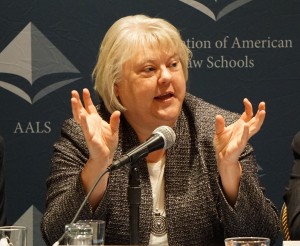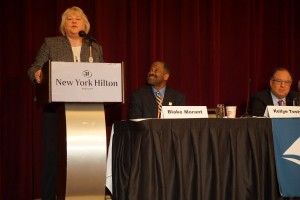Kellye Y. Testy, Dean of the University of Washington School of Law, became President of the Association of American Law Schools at the Annual Meeting on January 9, 2016. AALS sat down with Dean Testy to discuss her background and vision for the association and for legal education.

You selected “Why Law Matters” as the theme of your Presidency this year and for the 2017 Annual Meeting. Why does the law matter to you and what started you on the path to becoming a law professor and a dean?
When I started on a path to study law, I had very little exposure to or understanding of the law. I did not know any lawyers personally, nor did I have any substantial experience with law through other means.
But I did have a keen sense of fairness and justice and that, together with an introductory communications law class I took as part of my journalism major, propelled me to apply to law school. I recall an assignment that required us to go to the law library to find and read New York Times v. Sullivan. I can still remember the excitement I felt sitting in the stacks, reading the case and realizing that reporters were full of stories of encounters with the law. I was hooked and still am. I love continuing to learn more about law and justice.
Twenty-five years after my graduation from law school, I selected the theme “Why Law Matters” for this year to encourage reflection on the role of law in society. I believe that law is often seen too narrowly by non-lawyers and that its fundamental role in creating the foundations for human flourishing is insufficiently understood. Law is a critical partner with every other discipline in effectively addressing complex problems. As our world grapples with increasingly complex social challenges, my hope is that we appreciate the role of law in making positive change.
You are a first-generation college graduate. How has that affected your relationship with the law and legal education?
Being a first-generation college graduate is an important part of who I am. I never take education for granted; I see it as an enormous privilege and, in the words of bell hooks, “the practice of freedom.” I am especially motivated by public education and by institutions that are otherwise focused on access as part of their missions. My background has also helped me to understand power more deeply, to be able to look at the world from the bottom up so that I can understand how law and other forces may reinforce inequalities rather than reduce them.
Washington State recently implemented an innovative new credential designed to increase access to legal representation called limited license legal technicians. Can you explain the concept and your school’s involvement?
Washington was the first state to create a new form of limited license legal technicians (LLLT) for the legal services industry that permits persons who complete its requirements to work on certain family law matters. The basic idea is best illustrated by an analogy to the medical profession. In medicine, we don’t expect physicians to do everything. Another professional may be just as appropriate for a particular job. Other licensed professionals also make enormous contributions to the delivery of medicine, including physician assistants or nurse practitioners who perform many basic functions of medical care. Although there was a lot of fear at the outset that this might displace the work of lawyers, that fear has not materialized. These professionals are more like “super paralegals” and are helping to serve more clients in family law and help bridge the access to justice gap that plagues every state. We stepped up to partner with the Washington State Bar Association in this initiative by creating the curriculum and delivering it in an online format.
What can legal educators learn from innovations like limited license legal technicians?
It is important for all of us to face the enormous access to justice gap that plagues our legal system. Too many individuals who need legal representation cannot afford it and that not only hurts those individuals and our social fabric but it also undermines respect for the rule of law. Legal educators can and should be partners in innovations that address this gap.
There have been a number of changes in legal education over the last few years to better adjust to changes in the legal profession. What are some of the most significant innovations that you have seen? What other changes would you like to see?
I have been delighted to see how eagerly our member schools have sought to respond to the challenges and changes in our profession and in legal education. While trying to limit any increase in cost, schools have sought to increase quality. I’m especially happy to see more recognition of the wide range of skills that our graduates need to be successful and more courses that address these skills—including skills of financial literacy, technological literacy, and leadership competencies. Schools have also added substantially to opportunities for clinical legal education and have begun to integrate skills education in far more sophisticated ways.
What is your leadership style, and how will you use it to implement your ideas during your year as AALS president?
I love the subject of leadership, and one of the things I’ve learned is that effective leaders are “adaptive” rather than having just one style. I plan to continue learning more about leadership, as it is a lifelong project of development. That said, more than anything I see this role as a service to the legal academy and want our member schools to know that I am, and all of AALS is, here for them. We want to continue the robust dialogue we’ve had over the past few years with our members and use their input to make AALS even more responsive to their needs. I’ve been visiting with many member schools and look forward to doing more of that this fall. Invite me—I’ll do my best to make it!
What do you see as the greatest opportunity for AALS? What accomplishments would you like to see by the end of your term?
Legal education needs a strong, positive voice and AALS is seeking to do more in this regard. In addition to strengthening the professional development programs that we have long been known for, especially our Annual Meeting, I hope that we can make even more progress on being the leading voice for the legal academy. We are also seeking to address what has been a 40-year decline in interest in attending law school among college freshman according to a study from the Higher Education Research Institute at UCLA. Our new initiative is called “Before the JD,” and we plan to use surveys and focus groups to better understand what today’s college students understand about legal education.
What else do you want people to know about you and your leadership of AALS?
A year goes by fast, so let’s make the most of this. I’m here for you. And, I could not be more confident in the leadership of Judy Areen, the other members of the Executive Committee, and the hardworking and capable staff in Washington, D.C.
